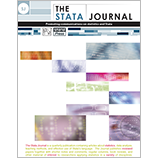A closer examination of subpopulation analysis of complex–sample survey data
Brady T. West
Center for Statistical Consultation and Research
University of Michigan, Ann Arbor
Ann Arbor, MI
[email protected]
|
Patricia Berglund
Institute for Social Research
University of Michigan, Ann Arbor
Ann Arbor, MI
[email protected]
|
Steven G. Heeringa
Institute for Social Research
University of Michigan, Ann Arbor
Ann Arbor, MI
[email protected]
|
Abstract. In recent years, general-purpose statistical software packages have
incorporated new procedures that feature several useful options for
design-based analysis of complex-sample survey data. A common and frequently
desired technique for analysis of survey data in practice is the restriction
of estimation to a subpopulation of interest. These subpopulations are often
referred to interchangeably in a variety of fields as subclasses, subgroups,
and domains. In this article, we consider two approaches that analysts of
complex-sample survey data can follow when analyzing subpopulations; we also
consider the implications of each approach for estimation and inference. We
then present examples of both approaches, using selected procedures in Stata
to analyze data from the National Hospital Ambulatory Medical Care Survey
(NHAMCS). We conclude with important considerations for subpopulation
analyses and a summary of suggestions for practice.
View all articles by these authors:
Brady T. West, Patricia Berglund, Steven G. Heeringa
View all articles with these keywords:
survey data analysis, statistical software, complex sample designs, subpopulation analysis
Download citation: BibTeX RIS
Download citation and abstract: BibTeX RIS
|
